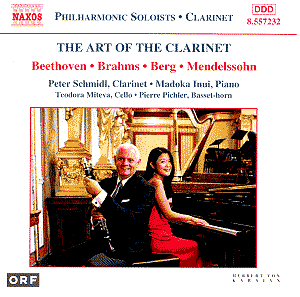This CD presents a
successful compilation of music that
would make for a great concert programme.
Opening with the charming Beethoven
trio and its most profoundly moving
slow movement, the mood is hitched up
a few notches to a soulful yet restrained
work by an aged Brahms. What follows
is a remote, atonal set of four pieces
by Berg and for a light-spirited ending,
some humorous Mendelssohn tunes.
Beethoven, Brahms and
Mendelssohn were all inspired directly
by clarinettists, and the CD notes on
this topic are certainly worth the read.
Especially amusing is the story accompanying
the composition of Mendelssohn’s Concert
Pieces – in return for the culinary
hospitality of the Baermann family,
whose son was a virtuoso basset-horn
player…"While the Baermanns
worked in the kitchen, Mendelssohn completed
his composition in the next room".
The Brahms trio is,
for me, the highlight of the CD. Directly
inspired by the playing of the Meiningen
court orchestra principal clarinettist,
Richard Mühlfeld, Brahms composed
this trio along with two clarinet sonatas
and a clarinet quintet. The clarinet
and cello are the instruments closest
to the human voice, and in Brahms’ trio,
this intimacy is heightened by a score
that treats every one of the instruments
on equal footing. It is, after all,
a yearning cello solo that opens the
first movement and sets the tone, thereafter
providing the driving thread that stitches
together the ever-shifting moods. The
connection between the clarinet and
cello is never more tender than in the
Andante grazioso about which
the musicologist and friend of Brahms,
Eusebius Mandyczewski, said "the
cello and clarinet sound as if they
were in love".
The Czechoslovakian
clarinettist, Peter Schmidl, is an undoubtedly
accomplished musician. He is the current
principal clarinettist of the Vienna
Philharmonic Orchestra and his solo
career is no less impressive. It is
therefore a shame that he is let down
by a timid piano and cello who seem
almost frightened of him. Most obviously
in the Brahms trio – my favourite! –
where all the instruments are conceived
with equal importance, the cello in
particular fails to sing out and opts
for a ‘safe’ rendition that treads very
carefully and refuses to assert its
voice.
Even though the Hyperion
recording, with Thea King (clarinet),
Katrina Georgian (cello) and Clifford
Benson (piano), is less accurate, their
performance has more soul, and the cello
and piano a greater presence that gives
an altogether more emotional and involving
interpretation.
Neither do I find the
Berg item totally satisfying. Dedicated
to his former teacher Arnold Schönberg,
Berg denied his Romantic inclination
and composed these four pieces in strictly
atonal style. I am not suggesting that
music that sits with difficulty on the
ears need necessarily be played in a
difficult manner, however I find this
recording too delicately executed. A
more suitable alternative, for my tastes,
is a recording made by Herbert Tichman
(clarinet) and Ruth Budnerich (piano)
that is almost uncomfortably vulnerable
with its harsh, unforgiving acoustic
and piercing clarinet tone. Not as polished,
perhaps, but certainly with an edge.
Ending on the Mendelssohn
buffoonery – music that belongs to the
dramas of early silent movies! – makes
for a nice, innocent rescue from the
esoteric territory of the Berg pieces.
In summation: a safe
recording of a wonderful run of pieces.
An enjoyable listen.
Aline Nassif
